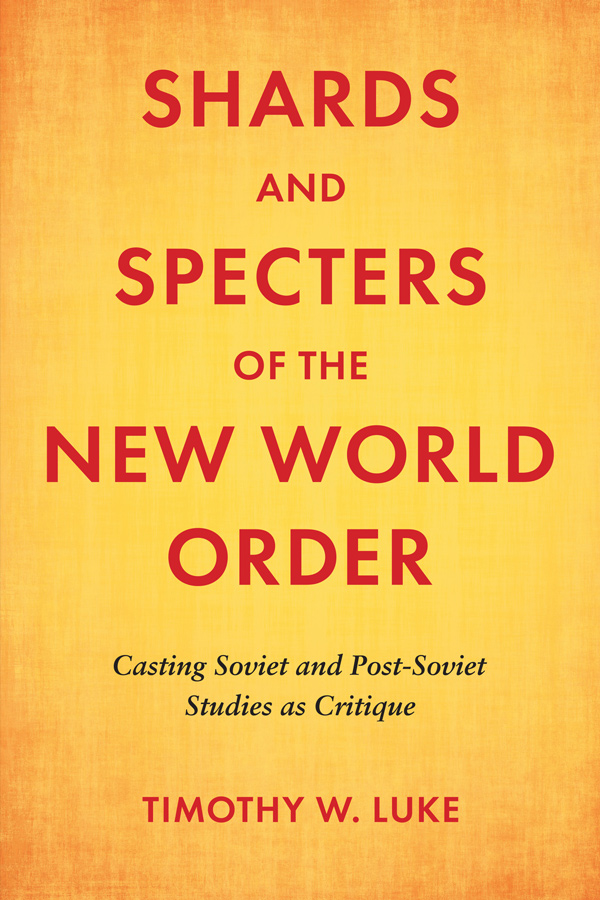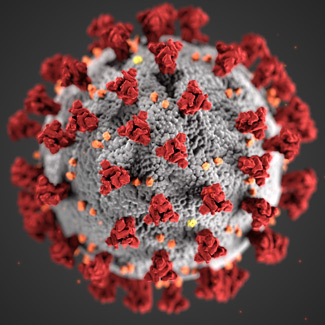By Telos Press · Friday, December 22, 2023 Now available: Shards and Specters of the New World Order, by Timothy W. Luke. Order the paperback edition today in our online store and save 20% by using the coupon code BOOKS20. Also available in Kindle ebook format at Amazon.com.
Shards and Specters of the New World Order: Casting Soviet and Post-Soviet Studies as Critique
by Timothy W. Luke
 From ideological dynamics in revolutionary Russia, cultural stagnation in the USSR, and ineffective Soviet governance in the 1980s to the USSR’s institutional collapse in 1991, the emergence of the Russian Federation under Boris Yeltsin, and Vladimir Putin’s wars in Ukraine since 2014, Timothy W. Luke’s Shards and Specters of the New World Order investigates how the geopolitical clout of the United States has worked to contain, but at other times sustain, the Soviet Union and later the Russian Federation. Luke’s critical studies also examine how Moscow’s strategies provoked radical Islamic resistance movements in Afghanistan and aided anti-Western client states, like Iraq and Syria, that threatened the New World Order envisioned in Washington after 1991. From ideological dynamics in revolutionary Russia, cultural stagnation in the USSR, and ineffective Soviet governance in the 1980s to the USSR’s institutional collapse in 1991, the emergence of the Russian Federation under Boris Yeltsin, and Vladimir Putin’s wars in Ukraine since 2014, Timothy W. Luke’s Shards and Specters of the New World Order investigates how the geopolitical clout of the United States has worked to contain, but at other times sustain, the Soviet Union and later the Russian Federation. Luke’s critical studies also examine how Moscow’s strategies provoked radical Islamic resistance movements in Afghanistan and aided anti-Western client states, like Iraq and Syria, that threatened the New World Order envisioned in Washington after 1991.
Continue reading →
By Norbert Bolz · Wednesday, December 2, 2020 When the historian Ernst Nolte formulated the thesis that Auschwitz was “the fear-induced reaction to the extermination processes of the Russian Revolution,” he was finished in the academic world. It was even of no help to him emphasizing that the copy was more irrational, more appalling and atrocious than the original. He was not forgiven the comparison since he seemed to call into question the singularity thesis, the incomparability of NS terror. That fit the taboo on totalitarianism theory. Right-wing and left-wing terror should not be mentioned in the same breath; National Socialism and International Socialism are not to be compared. And therefore all attempts to similarly work through the reign of terror by the Communists in its broad impact, as has been done with that of the Nazis, have been in vain. Of course, one would have to differentiate here. French intellectuals have undoubtedly been affected by the shocking reports by Koestler and Solzhenitsyn about the Moscow Trials and the Gulag. That was, at best, embarrassing for the German left. And so it should be no surprise that it celebrated Lenin’s 150th birthday—though under coronavirus conditions.
Lenin was the star of the Bolsheviks, who understood themselves to be the Jacobins of the twentieth century. He was undoubtedly an exceptionally gifted demagogue, but one should not imagine the Russian Revolution as resulting from a social movement; it was a project of intellectuals. The Bolshevik vanguard consisted of theorists, frequently emigrants, who had learned from Marx to use Hegel’s dialectic as a weapon. In this respect, the neo-Marxist bible History and Class Consciousness (1923) by Georg Lukács is still today unsurpassed. Here Hegel’s adroit dictum “all the worse for the facts” is taken seriously: more real than the facts is the totality as it presents itself from the standpoint of the proletarian class. In this way, dialectics becomes opium for the intellectuals.
Continue reading →
By Russell A. Berman · Wednesday, August 26, 2020 The following essay comments on the interview with Hans-Georg Maaßen conducted by Moritz Schwarz and published in Junge Freiheit on August 14, 2020. An English translation of the interview appears here.
In the wake of the opening of the Berlin Wall and the collapse of the Soviet Union, it appeared that liberal democracy was on an inexorable victory march around the world. The Soviet satellite states threw off their Communist shackles, and the occupied Baltics regained their independence. Even Russia seemed briefly to be lurching toward modern governance structures, and the Central Asian states, the “stans,” claimed their own sovereignty (if only, often as not, to revert to indigenous forms of authoritarianism). The age of Latin American dictatorships belonged to the past, certainly in the southern cone and in Brazil, although not in Venezuela and Cuba. The last aftershocks of that democratic optimism informed the hope that toppling Saddam Hussein in Iraq would set off a similar democracy wave in the Middle East; no doubt the demonstration of the vulnerability of the dictator in Baghdad set the stage for the Arab Spring of 2011, another burst of hope.
That Arab Spring of hope gave way to a new winter in the Middle East and not only there. The wave of democracy has been followed by a wave of repression. Perhaps one should have paid more attention in 1989, which not only witnessed the November celebration in Berlin but also the bloody June in Beijing, where the democracy movement at Tiananmen was murdered by the Communist Party and its tanks. It was wrong to assume that the formal end of the Soviet Union meant the end of Communism altogether or that Communist agitation would cease to undermine free societies. That old mole continues to burrow.
Continue reading →
By Arta Khakpour · Wednesday, July 22, 2020 In 1972, Irving Kristol noted the striking fact that the New Left seemed to lack a coherent economic critique of the status quo, besides occasional Marxist platitudes borrowed from the Old Left:
The identifying marks of the New Left are its refusal to think economically and its contempt for bourgeois society precisely because this is a society that does think economically.
What really ailed American society, and what the New Left could sense but not articulate, Kristol wrote, was a spiritual malady. Despite the efforts of Burkean conservatives, the “accumulated moral capital of traditional religion and traditional moral philosophy” had been steadily depleting since the French Revolution, and with its depletion, so too society’s abilities to cope with the material inequalities, resentments, and indignities made inevitable by the free exchange of goods and services.
Continue reading →
By Saladdin Ahmed · Wednesday, March 18, 2020  There are three reasons to believe that COVID-19 is a communist agent. First, it is universalist; it does not recognize or respect national borders. Second, it is atheist; it has forced cancellations of pilgrimages, along with thousands of other religious rituals. Third, it has been threatening the capitalist economic order across the globe. There are three reasons to believe that COVID-19 is a communist agent. First, it is universalist; it does not recognize or respect national borders. Second, it is atheist; it has forced cancellations of pilgrimages, along with thousands of other religious rituals. Third, it has been threatening the capitalist economic order across the globe.
Perhaps it is inappropriate to joke about COVID-19. However, the pandemic’s increasing traumatic effects across the world are precisely the reason we should also joke about it. Those of us who have lived through calamities realize that sarcasm, far from being disrespectful to human suffering and loss, can be nobler than any serious expression that will inevitably undermine the actual experience. Those of us who have lived through something along the lines of the following examples know the indispensability of sarcasm: living defiantly in the face of the terror devised by a totalitarian regime; being a political prisoner under a fascist regime; taking the first physical steps to leave every place and everyone one has ever known; or, crossing bloody borders in a mythic-like quest in search of a place where one can continue to exist, even if merely as an ontological mistake. Humor is almost a natural coping mechanism when everydayness becomes a struggle for survival. One can easily observe that despite the apparent contradiction, there is more laughter among political prisoners who are facing death than among the affluent in luxurious social settings that are prepared specially to prevent boredom and dread.
Continue reading →
By Michael Marder · Friday, June 16, 2017 Critique of phenomenology amounts to a tiny piece of the puzzle that is Gianni Vattimo and Santiago Zabala’s thought-provoking Hermeneutic Communism: From Heidegger to Marx. According to the spot allocated to it, phenomenology fits in with the other manifestations of classical metaphysics, bent on preserving the transcendental privilege of immutable truth. In what follows, I will argue that such placement may not do justice to phenomenology, which, in its most critical manifestations, is an ally of hermeneutic communism. This particular piece of the puzzle belongs on the other side of the intellectual and historical barricades, and, more importantly, holds the potential for mediating between the various opposed camps—description and interpretation, realism and anti-realism, the strong and the weak, metaphysics and postmetaphysics—that Vattimo and Zabala keep apart.
Continue reading →
|
|
 From ideological dynamics in revolutionary Russia, cultural stagnation in the USSR, and ineffective Soviet governance in the 1980s to the USSR’s institutional collapse in 1991, the emergence of the Russian Federation under Boris Yeltsin, and Vladimir Putin’s wars in Ukraine since 2014, Timothy W. Luke’s Shards and Specters of the New World Order investigates how the geopolitical clout of the United States has worked to contain, but at other times sustain, the Soviet Union and later the Russian Federation. Luke’s critical studies also examine how Moscow’s strategies provoked radical Islamic resistance movements in Afghanistan and aided anti-Western client states, like Iraq and Syria, that threatened the New World Order envisioned in Washington after 1991.
From ideological dynamics in revolutionary Russia, cultural stagnation in the USSR, and ineffective Soviet governance in the 1980s to the USSR’s institutional collapse in 1991, the emergence of the Russian Federation under Boris Yeltsin, and Vladimir Putin’s wars in Ukraine since 2014, Timothy W. Luke’s Shards and Specters of the New World Order investigates how the geopolitical clout of the United States has worked to contain, but at other times sustain, the Soviet Union and later the Russian Federation. Luke’s critical studies also examine how Moscow’s strategies provoked radical Islamic resistance movements in Afghanistan and aided anti-Western client states, like Iraq and Syria, that threatened the New World Order envisioned in Washington after 1991.  There are three reasons to believe that COVID-19 is a communist agent. First, it is universalist; it does not recognize or respect national borders. Second, it is atheist; it has forced cancellations of pilgrimages, along with thousands of other religious rituals. Third, it has been threatening the capitalist economic order across the globe.
There are three reasons to believe that COVID-19 is a communist agent. First, it is universalist; it does not recognize or respect national borders. Second, it is atheist; it has forced cancellations of pilgrimages, along with thousands of other religious rituals. Third, it has been threatening the capitalist economic order across the globe. 

